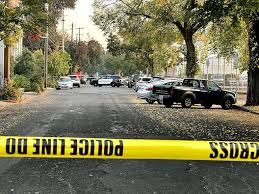PORTLAND, Ore. (KOIN) — A new national report challenges political narratives about surging crime, showing that violent crime has been steadily decreasing across the United States, including in cities where former President Donald Trump deployed or attempted to deploy National Guard troops.
The Major Cities Chiefs Association (MCCA) released the findings on November 3, analyzing violent crime data from January 1 to September 30, 2025, across 67 U.S. cities and nine Canadian municipalities. The study compared those figures to the same period in 2024, tracking trends in homicide, rape, robbery, and aggravated assault.
Nationwide Crime Trends Show Improvement
According to the report, violent crime dropped nationwide compared with 2024. Each major category showed a measurable decrease, contradicting claims that crime is out of control in urban areas.
Also Read
-
Homicides: 4,143 reported in 2025, down from 5,126 in 2024.
-
Rape: 20,407 incidents in 2025, compared with 21,728 in 2024.
-
Robberies: 66,501 in 2025, down from 81,860 in 2024.
-
Aggravated Assaults: 194,804 in 2025, compared with 216,466 the year before.
These figures reflect an overall downward trend in serious violent offenses across the country, including in many cities that have been publicly labeled as “dangerous” or “lawless.”
Declines Seen in Cities Targeted by Federal Action
The MCCA report highlighted declines in violent crime in nearly all cities where the Trump administration deployed, or sought to deploy, federal troops to “restore order.” These included Portland, Memphis, Washington D.C., Chicago, and Los Angeles—each of which showed marked improvements over the previous year.
Portland: Sharp Drop in Homicides and Robberies
In Portland, homicides fell from 56 in 2024 to 34 in 2025, marking one of the city’s most significant annual drops in recent years.
Reports of rape also declined slightly, from 274 to 253, while robberies decreased from 828 to 756. The number of aggravated assaults dropped from 2,354 to 2,299.
Despite these declines, President Trump had announced plans to deploy federal troops to Portland earlier this year, a move blocked by a federal judge who ruled it unconstitutional.
Memphis: Crime Down Across All Categories
The city of Memphis, Tennessee, reported broad reductions in violent crime.
-
Homicides: 164 in 2025, down from 202 in 2024.
-
Rapes: 199 in 2025, compared with 260 in 2024.
-
Robberies: 1,259 in 2025, down from 1,609 the previous year.
-
Aggravated Assaults: 4,718 in 2025, compared with 5,796 in 2024.
Even with these decreases, the administration deployed troops to Memphis in September, citing public safety concerns.
Washington, D.C.: Notable Reduction in Assaults and Homicides
In Washington, D.C., the Metropolitan Police Department also recorded declines in nearly every category.
-
Homicides: Dropped from 139 to 109.
-
Rapes: Fell from 121 to 71.
-
Robberies: Remained steady at 802.
-
Aggravated Assaults: Fell significantly, from 1,595 to 1,053.
Nevertheless, troops were sent to the capital in August, despite data showing crime had already been trending downward.
Chicago: Significant Reductions Despite Federal Rhetoric
Chicago, often spotlighted in political debates about urban crime, saw some of the most pronounced decreases.
-
Homicides: Fell from 450 in 2024 to 323 in 2025.
-
Rapes: Decreased slightly from 1,501 to 1,485.
-
Robberies: Dropped from 6,904 to 4,572.
-
Aggravated Assaults: Declined from 14,061 to 11,469.
Even with those reductions, Trump used Truth Social earlier this month to renew calls for deploying the National Guard to Chicago. A federal appeals court later issued a preliminary ruling blocking the move.
Los Angeles: Downward Trend Continues
In Los Angeles, the decline in violent crime was similarly strong:
-
Homicides: 229 in 2024 to 177 in 2025.
-
Rapes: 1,136 in 2024 to 940 in 2025.
-
Robberies: 6,536 in 2024 to 5,486 in 2025.
-
Aggravated Assaults: 13,691 in 2024 to 11,590 in 2025.
The president initially sent troops to Los Angeles in June, citing civil unrest during protests, but a federal judge later ruled the deployment illegal. The troops have since been withdrawn.
Experts Urge Data-Driven Discussion
Law enforcement analysts and criminologists say the MCCA report underscores the importance of basing public policy on data, not perception.
While isolated violent incidents often dominate media headlines, the long-term trend indicates progress in reducing violent crime nationwide.
Officials from several police departments echoed that sentiment, noting that increased community engagement, better coordination, and technology-based policing strategies have contributed to the decline.
Conclusion: Facts Challenge Fear-Based Narratives
The MCCA findings contradict ongoing political claims of “crime waves” and urban “lawlessness.” Across multiple cities — including those singled out by federal authorities — data show consistent reductions in violent crime, even in places that experienced large-scale protests or national scrutiny.
As the numbers continue to trend downward, experts say it’s crucial for policymakers to focus on sustaining progress through investment in prevention, rehabilitation, and local community partnerships—rather than resorting to military intervention.












